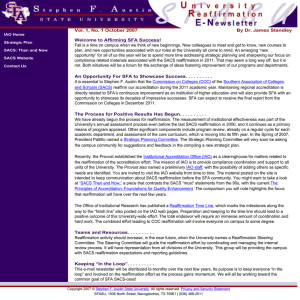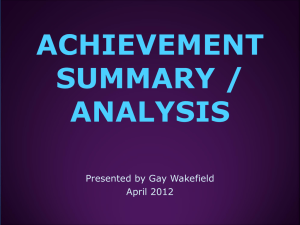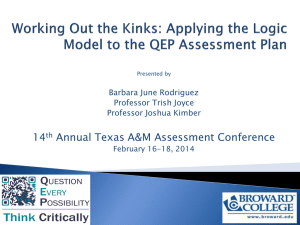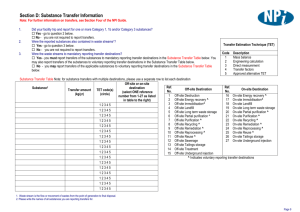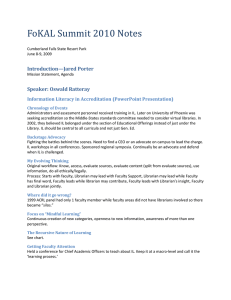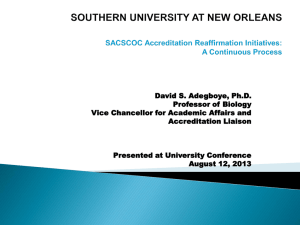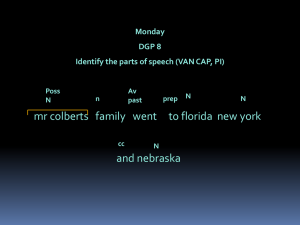News and Public Affairs: Meeting the Media
advertisement
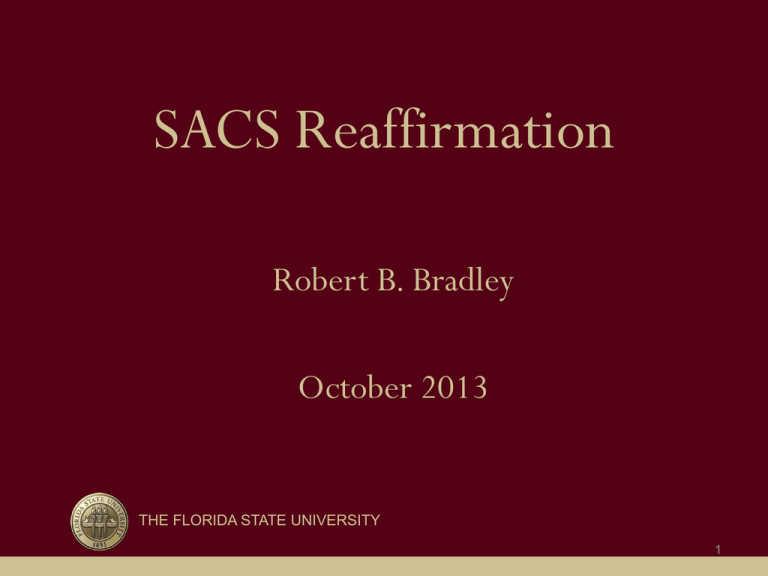
SACS Reaffirmation Robert B. Bradley October 2013 THE FLORIDA STATE UNIVERSITY 1 Southern Association of Colleges and Schools Commission on Colleges Reaffirmation • Accreditation reaffirmed by SACSCOC every ten years (our regional accrediting body) • Compliance Certification • Quality Enhancement Plan • Reminder: Why is it important? – Federal funding • Student Financial Aid • Federal Contracts and Grants – Reputation – State Requirements – Commitment to higher education – Desire to continuously improve quality 2 What is Involved? • Core Requirements – 12 requirements, all of which must be met • Comprehensive Standards – 66 components • Federal Requirements – 12 components 94 Specific Components plus applicable policies and guidelines 3 Accreditation Review • Involves three reviews 1. Off-site peer review 2. On-site peer review [Tallahassee; Panama City, Florida; Panama City, Panama; Jacksonville, Florida; Sarasota, Florida, Gainesvillle, Florida; West Palm Beach, Florida; Distance Education] 3. Review by Commission’s Board of Trustees 4 SACS Compliance Documents Were Submitted – September • Digital Submission • Text of more than 500 pages of narrative • Approximately 3,500 associated files of documentation (each hyperlinked to narrative on the relevant standard) • Drew upon university data files and systems covering topics such as institutional effectiveness, student courses, faculty member vitae 5 Common Problem Areas For Universities Up For Reaffirmation • Each course is taught by faculty with acceptable qualifications with the appropriate evidence • Number of full-time faculty is adequate to support mission and ensure quality • Complete set of student learning and program outcomes and their use for education, administration, support, research and service • Evidence of on-going, integrated and institution wide research based planning and evaluation • College level general education competencies • 25% of courses hours in majors taught by faculty holding appropriate terminal degree • General education component meets criteria • Distance Education meets all criteria • Off campus Instructional Programs meet all criteria • Acceptable Quality Enhancement Plan with funding 6 SACS Decennial Reaffirmation September 10, 2013 Compliance Certification Submitted November 2013 Off-site committee meets in Atlanta Dec 2013 - Jan 2014 Focused Report and QEP due [6 weeks before the on-site visit: ~Jan 27th ] March 2014 Visit to Select Off-Campus Instructional Sites: Panama City, FL Republic of Panama Sarasota Jacksonville Gainesville West Palm Beach March 25-27, 2014 On-site visit: Tallahassee Jul - Sep 2014 Response to the Report of the Reaffirmation Committee due, if needed [5 months after visit] December 2014 Reaffirmation decision 7 Off-Site Peer Review Twelve Member Committee lead by Provost Bert Bach, East Tennessee State University SACS Staff Leader – Dr. Cheryl D. Cardell, Vice President, SACSCOC Other members include, but not limited to: Provost, Dean of Libraries, Assistant Vice Chancellor for Student Life, Vice Presidents for Finance (two), Chancellor of Medical School, Faculty Member, and Dean 8 On-Campus Visit 1. Team will be lead by: Dr. David R. Hager Sr., Chair, Emeritus Professor of Higher Education and International Studies Old Dominion University 2. SACS Staff leader will be: Dr. Charles A. Taylor Vice President, SACSCOC 3. Other Team members – to be announced in December 2013 9 Next Steps • November 7-8, 2013 – Review of materials by off-site team • SACS VP visit and consultation (December 13) • Nov. 25th to Jan. 17th – Preparation of Focused Response to Off-Site Committee Comments – QEP completion • On-Site Chair visit and consultation (January 17) • Jan. 27th to March 7th – Preparation for onsite visits 10 Additional Steps That May Call for Your Participation 1) Help insure complete transcript file 2) Fill in gaps in the Institutional Effectiveness data 3) Mutual understanding of relationships with OffCampus Sites (Panama City (Florida), Republic of Panama, Asolo, Gainesville, Jacksonville, West Palm Beach) 4) Help in response to findings by the Off-Site Committee 5) Be available for visits by SACS representatives 6) Participate in vetting and completion of the 11 QEP On-Site Committee may want to review transcripts of 4,000 faculty and graduate students 12 Finance Bachelor’s: 2011-2012 One of Seven Student Learning Outcomes Financial Valuation Analysis [Student Learning Outcome-59143] Start Date: 08-25-11 End Date: 08-06-12 Outcome Type: Critical Thinking Skills, Content/Discipline Knowledge & Skills On-Site Committee will want to see more than the sample we submitted Define Outcome: Upon completion of the course of instruction, the student will be able to perform a fundamental financial valuation analysis. Assessment and Evaluation Process: Each section of FIN 3403, Financial Management of the Firm, includes course embedded exam problem(s)/question(s) to assess this learning outcome. The instructor-constructed problem(s)/question(s) are approved by the department curriculum committee to assure all aspects of the learning outcome are assessed. Students are required to identify relevant cash flows, discount the cash flows, calculate a net present value, and make an appropriate decision based on the net present value in the context of the operation of the firm and the goals of the financial manager. It is expected that at least 75% of students in each course section will receive a score of 70% or higher on the assessment problem. Method(s): Instructor Constructed Exam. Results: A subcommittee of the Finance Curriculum Committee met with the Chair of the Finance Department on June 1, 2012, to review and consider the year's results --- that is, evaluate how the Finance Department's Student Performance Outcomes, assessments and reporting procedures worked for the Fall 2011 and Spring 2012 semesters; identify problems, if any; and discuss how we can continuously improve. The consequence of this meeting was: 1) the following observations, and 2) action steps to be implemented beginning with the Fall '12 semester and appearing under the separate heading, Improvements Made or Action Plan Based on Analysis of Results. With respect to the Student Learning Outcome for FIN3403, it was observed that: * FIN3403 sections, as a whole, consistently achieve right at the Student Learning Outcome set by the Finance Department faculty. Specifically, of the 1,519 students assessed over the Fall '11/Spring '12/Summer '12 period (compared to 1,309 the prior academic year), 87% of students achieved a score of 60% or better on the designated assessment (compared with 80% prior), 75% achieved a 70% or better (73% prior), 69% achieved a 78% or better (59% prior), 56% achieved an 80% or better (55% prior), and 28% achieved a 90% or better (41% prior). * Moreover, of the 9,855 students assessed over the past six academic years, 86% of students achieved a score of 60% or better on the designated assessment, 75% achieved a 70% or better, 67% achieved a 75% or better, 58% achieved an 80% or better, and 34% achieved a 90% or better. * We would expect students in FIN3403, which is required for all business students as part of the core curriculum, to be suitably challenged by the rigor of the content. There appear to be no compelling reasons to either raise or lower the current Student Learning Outcome at this time. * A section of FIN3403 is taught each semester in HCB in a classroom accommodating an enrollment of 500 students. We continue to use this facility (roughly 50 percent of the 1,247 students assessed in Fall '11 and Spring '12 academic year without Summer '12). This allows the Finance department to remove doctoral students from the classroom as instructors, in order to meet AACSB's Participating Faculty standards. * We continue to observe virtually no change in goal achievement compared with the previous years using partially standard classroom sizes and the 500 seat auditorium (see year to year statistics in the first point above). * We note that differences in general performance rates for the past two semesters are immaterial (and still exceed performance goals) compared to the rates for the prior two semesters (Fall '10 and Spring '11). Compared to the overall rates for the past five academic years, we believe the notable drop in the % of students achieving over 90% on the assessment this past year is attributable to a concerted intent and effort on the part of the recent faculty teaching FIN3403 to expand the content and increase the rigor of the course. * In addition, there are no observable material differences in the performance of classes taught in large enrollment sections (150 seat and 500 seat auditoriums) vs. classes taught in average enrollment sections (standard classroom). We take stock of this every semester since staffing large sections, in addition to standard sections, is the only feasible means of meeting the significant demand for this class. We are fortunate to have several faculty instructors who enjoy teaching the larger FIN3403 sections and are particularly effective in that setting. Improvements Made or Action Plan Based on Analysis of Results: Giving consideration to the observations and analysis (above) made by the subcommittee of the Finance Curriculum Committee and the Chair of the Finance Department, it was concluded that: * the Student Performance Outcome for FIN3403 should remain at 75%, that is, 75% of students are expected to achieve a 70% or better on the identified material. We discussed the potential for raising this bar, as the "B-" rule was established last year for Finance majors. We are still aware that this course remains a requirement for COB majors other than Finance. * the present standard appears appropriately rigorous given the level and mix of students being taught. This will continue to be monitored carefully over the next year. Focus will be on the uniformity of the assessment instrument, given the many sections of FIN3403 taught. * the assessment questions should be, and are, continuously revisited. For continuity and fair comparisons, we have developed and revised by Committee a set of 15 questions, imposed on adjunct and doctoral student instructors and highly recommended to faculty instructors. Over the next year the Committee will further investigate student performance on a question-by-question basis. The purpose will be to identify areas (if any) of the Student Learning Outcome not being fully addressed in certain or all sections and/or to upgrade assessment questions. Such a review was undertaken prior to the '06/'07 period, and minor changes were made to the question set. A subsequent review was undertaken spring '12, and one minor rewrite was made to one question to be used in subsequent semesters. Since on review the subcommittee and Department Chair found no evidence to support the recommendation of changes to the current Student Performance Outcome for FIN3403, no recommendation will be made to the Finance faculty at this time. 13 One Last Matter: University QEP – Chair: Professor Helen Burke will provide an update on its status 14

